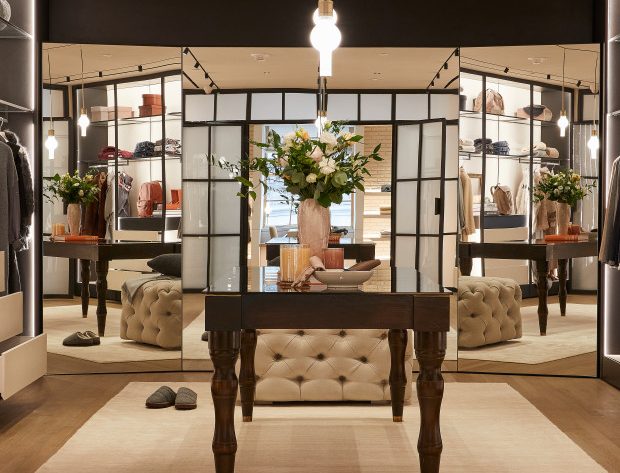Walking into Casa Cucinelli, the invite-only shopping salon of Italian label Brunello Cucinelli in New York City, my first thought is that it looks as if I’ve stepped into the quietly luxurious loft of one of the Roy children.
On my right is a nook filled with wines imported from Italy and bottles of olive oil produced in Solomeo, the central Italian hamlet that’s home to Brunello HQ. Couches are draped with blankets made of cashmere and wool. There’s a library, a white marble kitchen counter, a fireplace and a walk-in closet. Luxuriously logo-less, taupe and camel-hued outfits from the brand’s current collection line the walls.
Photo: Justin Bridges/Courtesy of Brunello Cucinelli
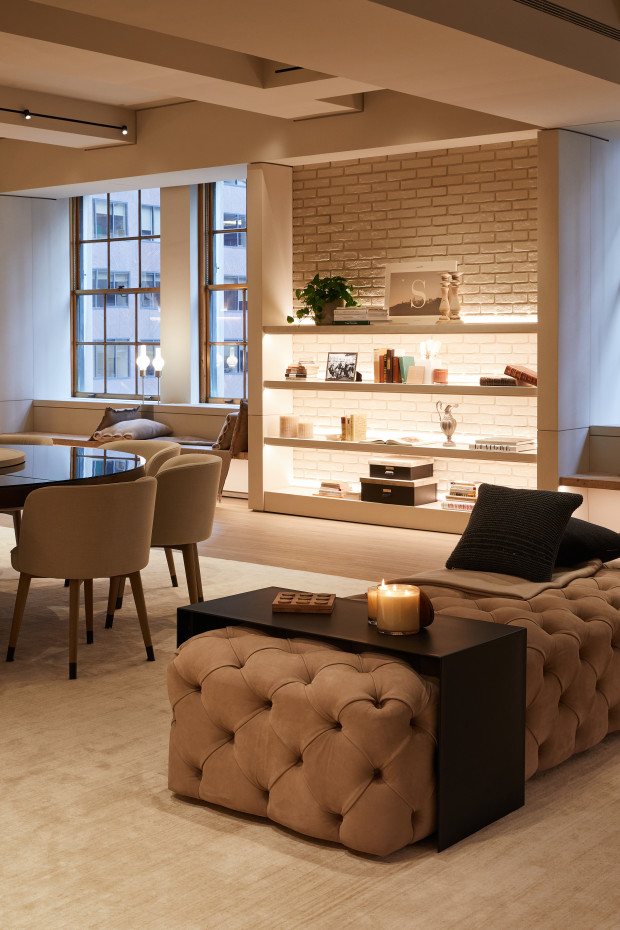
Photo: Justin Bridges/Courtesy of Brunello Cucinelli
The first Casa Cucinelli opened in 2019 (its New York location came in 2021); it’s meant to be an intimate space where friends of the brand can privately shop in-season items, as well as host and attend events and parties. “Authentic Italian hospitality is such an integral part of our brand culture,” says Massimo Caronna, president and CEO of Brunello Cucinelli North America. There are now seven of these spaces around the world, each embodying a mix of the locale and the brand’s DNA.
Brunello Cucinelli is among a number of high-end fashion houses and retailers that have tested a new shopping experience beyond the classic boutique: exclusive, intimate spaces that are now popping up more and more, in an effort to target luxury’s top customers.
“If you look at the kind of standard distribution of where most of the profits are coming from, there’s a very small percentage of people who are generating a lot of those profits for those companies,” says Juan Manuel Gonzalez, founder and CEO of G & Co. a consulting firm that has worked with brands including Louis Vuitton and Burberry. “That very personalized, exclusive touch is going to go ahead and maybe provide a little bit more of that loyalty with the consumer, because they know that they can really have that profitable relationship with them.”
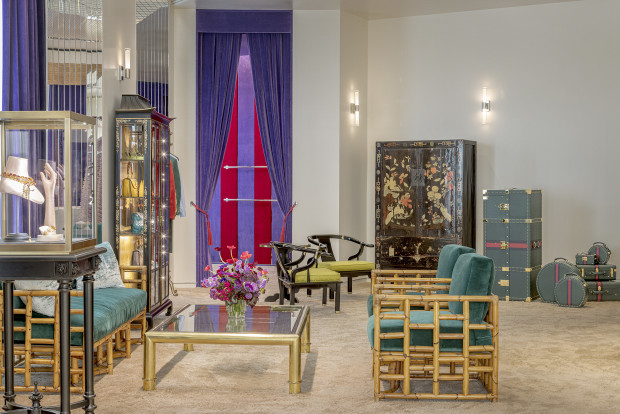
Photo: Pablo Enriquez/Courtesy of Gucci
There are appointment-only stores, like Thom Browne’s Tennis Pro Shop at the exclusive Epi club in Saint Tropez and the Gucci Salon in Los Angeles, or private areas within traditional stores, like Chanel’s Salon Privés, which are “dedicated areas within our boutiques (that) allow us to present our collections to our clients in the best possible conditions, even though our boutiques are very busy,” as the brand explained in a statement. (The concept isn’t new for Chanel, but the house is opening new kinds of VIP spaces in China this year.)
“Invite-only strategy is a way to protect the brand image,” says Robert Burke, chairman and CEO of consultancy Robert Burke & Associates. “The resale market made rare, high-demand items more accessible than ever before. Brands had to find new ways to maintain exclusivity and elevate the shopping experience for their high-value customers.”
While quality is crucial in establishing loyalty, a brand’s positioning helps set it apart from its competitors. “The marketing that attracts you to the product is going to be the difference-maker,” says Gonzalez. “Part of that is the aura of exclusivity, making sure that it’s not overproduced, making sure that prices are aligned with a kind of price-value perception from the buyer.”
These private shopping spaces are a way to make these shoppers feel as though they’re a part of something exclusive, helping to justify the increased cost of luxury goods. The highest tier of VIP customers may not be as affected by shifts in price; meeting their needs becomes of utmost importance for brands.
“In 2019, we noticed there was an increased desire for personalized retail experiences from our clients,” Caronna says. “We also saw more of a focus around the concept of ‘privacy’ as the truest form of luxury.”
If wealth whispers, it also hopes to spend behind closed doors.
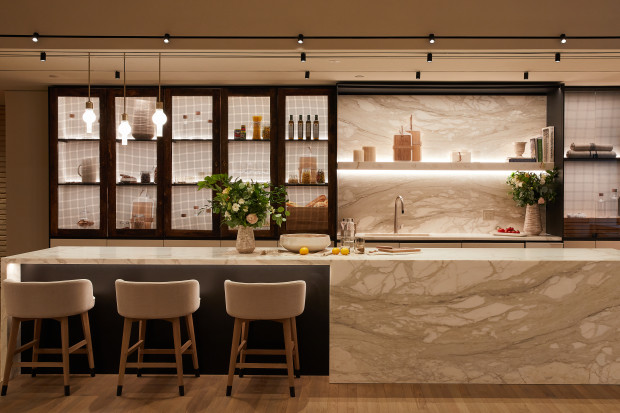
Photo: Justin Bridges/Courtesy of Brunello Cucinelli
“High-value clients are very demanding,” says Burke. “You won’t see them lining up for a chance to purchase a limited-edition item with the general public. They need exclusive access and an ability to shop at their own pace in a welcoming environment.”
These days, Instagram and TikTok are full of videos advertising secret bars, under-the-radar shops and up-and-coming restaurants, but these shopping spaces hold their own sort of caché — and the customers are influencers within their own right.
“They’re important ambassadors for the brand,” says John Antonini, SVP, director of stores for Saks Fifth Avenue. “They speak to their circle, introduce us to people, bring people to us on trips that we may not know.”
Saks Fifth Avenue has had shopping salons — known as the Fifth Avenue Club — housed within its larger retail spaces for over 50 years. Now, it’s testing a different approach, partnering with luxury hotels and resorts, including The St. Regis and Ritz-Carlton, to offer private shopping suites for both hotel guests and local customers who may not have access to a traditional Saks location. The salons are by referral or invitation only.
“There are lots of retail choices in Orange County, but we offer a differentiated shopping experience (at the Ritz-Carlton in Laguna Beach) that’s designed just for you,” he says. “You have a consultation before the appointment, then you enter this beautiful hotel suite that’s truly curated just for you with a stylist who has pulled in your favorite brands.”
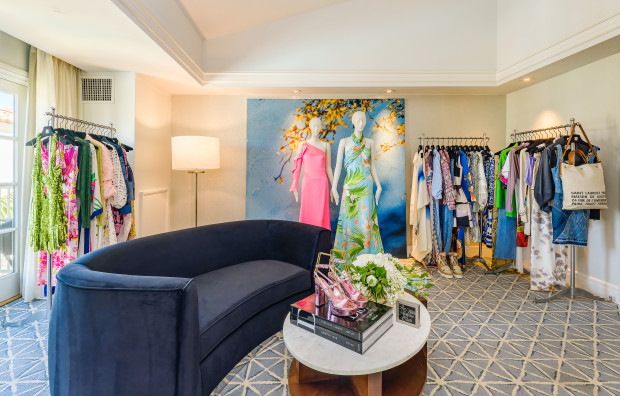
Photo: Courtesy of Saks Fifth Avenue
While some, like Gucci Salon on L.A.’s Melrose Blvd., are located in expected fashion destinations with a high concentration of A-listers and top-tier clients, many of these luxury spaces are popping up in other locations based on data and strategy that allows these brands to meet clients where they are (but might not be catered to just yet).
Still, with a limited number of high-spending clients now being courted by brands with a range of private experiences, are they spoiled for choice? As high-spending clients get used to this level of personalized service every time, it may eventually become the expectation, rather than a singular example of a brand going above and beyond. Will this approach begin to lose its power?
“If this is the most profitable segment and you can make a return on investment, it just makes sense. That doesn’t mean that it can be just as effective every single year,” says Gonzalez.
Profitability may be one motivator short-term on the brand side, but Caronna sees these spaces as something more abstract: a chance for customers to know and understand its ethos, allowing it to, ultimately, build an authentic connection with its customers.
“What I think is key for us is authenticity and longevity,” he says. “We want to connect with people in the long term and grow our relationships with future generations of clients. This is something that aligns very earnestly with Mr. Cucinelli’s humanistic approach to both business and life.”
Cocooned into a deep, body-encompassing beige suede couch in the Cucinelli loft, it’s an experience I’ll not soon forget.
Want the latest fashion industry news first? Sign up for our daily newsletter.
